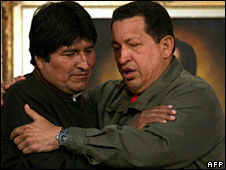LatAm leaders reject Bolivia bid
April 24, 2008 - BBC
Leaders from four Latin American countries have rejected a controversial autonomy bid by a region of Bolivia.
 The leaders of Bolivia, Venezuela, Nicaragua and the Cuban vice-president denounced the move as an illegal attempt to destabilise the country.
The leaders of Bolivia, Venezuela, Nicaragua and the Cuban vice-president denounced the move as an illegal attempt to destabilise the country.
(right) Mr Morales received backing from his leftist allies, including Hugo Chavez
They were speaking after emergency talks in Venezuela's capital, Caracas.
Bolivian opposition members have announced they will hold a referendum on 4 May to demand autonomy for the eastern province of Santa Cruz.
The four leaders said they will not recognise the fertile, gas-rich region as an autonomous entity.
Emergency meeting
Speaking to the BBC earlier, Bolivian President Evo Morales had dismissed the vote as illegal.
He accused the opposition - led by wealthy landowners - of refusing to accept an indigenous president.
The Caracas meeting had brought together some of Mr Morales's closest left-wing allies - the presidents of Venezuela, Hugo Chavez, and Nicaragua, Daniel Ortega, as well as Cuba's Vice-President, Carlos Lage.
Mr Chavez had called the emergency meeting, declaring that Bolivia was "on the point of exploding".
Four of Bolivia's nine provinces want greater autonomy. All are in the less indigenous and wealthy eastern lowlands, home to most of the country's oil and gas reserves.
Mr Morales says the push for autonomy is no more than an attempt by the rich minority to keep their long-held privileges, and to undermine his policies of helping the poor indigenous majority.
"They can't accept that a campesino, an Indian, can be president of Bolivia," he told the BBC's Spanish-language news website, BBC Mundo.
"And if we look at history, we see that there have always been demands for federalism when the rich minority have lost control of central government, but then when they get it back again, they forget all about autonomy."
Public resistance
Mr Morales said the autonomy demands were creating division, but he did not expect them to lead to violence, adding he had faith in the "conscience of the Bolivian people".
Mr Morales said his government could do "nothing" to prevent steps towards autonomy in Santa Cruz, but said the Bolivian public would resist them.
And he said the proposed new constitution would support a kind of autonomy.
"First comes the new constitution. And through the new constitution the government will guarantee autonomy," he said.
"But it will be autonomy for the people, not autonomy for the rich elite in Santa Cruz."
The country had been due to hold a referendum next month on the draft constitution - which grants more rights to the indigenous majority - but it has been postponed by the National Electoral Court, which ruled that there was not enough time to prepare for the vote.
Opponents of the new constitution say it would unfairly privilege indigenous groups over the rest of the population.